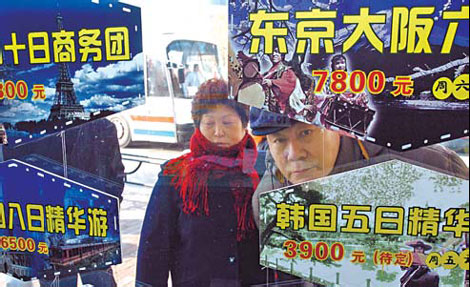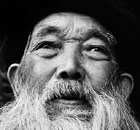Top Biz News
Number of outbound tourists soaring
By Yu Tianyu (China Daily)
Updated: 2010-03-29 09:09
 |
Large Medium Small |
Chinese tourists' preferences mostly depends on age, she said. Travelers aged from 20 to 35 would like to go Japan, South Korea, Singapore and Malaysia and those 35 and above prefer to visit Europe, Australia and the United States. Older tourists often chose South Africa and Egypt.
|
 |
|
A senior couple read posters advertising travel offers on the window of a travel agency in Shanghai. Residents of the municipality comprise a large number of Chinese outbound travelers. [China Foto Press] |
More and more Chinese prefer to visit one or two countries during an overseas trip and they have raised their requirements on accommodation and flights, Ma added.
Ding Ding, public relations manager of Hua Yuan International Travels Company Ltd, said that most Chinese tourists would like tour groups of less than 30 people, direct flights and four-star hotels or above.
According to online figures from Chinese hotel and destination review website Daodao.com, about 34 percent of Chinese travelers choose budget hotels, 26 percent prefer four-star hotels and 16 percent of them choose five-star hotels.
More than 61 percent of Chinese tourists conducted online research ahead of their trips and about 48 percent of travelers would make adjustments to their trip based on information they received from online travel bulletins, an AC Nielson report showed.
Industry insiders recommend tourism businesses and travel agencies to maintain online communication with their Chinese customers as much as they can.
Speaking as a former journalist, Gregory Hywood of Tourism Victoria said tourism and journalism were similar industries in that they are both about marketing and people. "Firstly, you'd better learn more about the demands of Chinese tourists. And, you need to work hard on how to promote what they are able to get from your place and also consider seriously how to provide better services to them when they arrive," he said.
Dai Bin, deputy head of the China Tourism Academy, said countries should provide more services and facilities in Chinese in order to enhance satisfaction rates.
Talking about shopping - perhaps the most important activity when Chinese people travel abroad - Hywood said a flourishing number of both emerging and established designers in Melbourne were showing off their products.
"Flinders Lane in Melbourne in particular has become a beacon for fashionistas, with everything from high-end labels to vintage pieces to be found," said Luee Sun, a London-based buyer who purchases fashion items for department stores.
Sun said also Oxford Circus in London and Fifth Avenue in New York were both driving Chinese "shopaholics" crazy.
The Galleries Lafayette in Paris reported that a typical Chinese tourist spent 1,000 euros in two hours last year, topping tourists from other countries.
The Annual Report of China Outbound Tourism Development 2009-2010 said Chinese tourists are expected to spend $6.86 billion overseas in 2010, which is up by 14 per cent from a year earlier.
Ding of Hua Yuan said her company arranges shopping-themed tour groups in both discount seasons of July to August and December to February.
Also, cards from China UnionPay, the Chinese bankcard association, are accepted in 90 countries and regions outside China and they have ATM machines in more than 50 countries and regions.
Zhang Chi, a 26-year-old self-confessed "shopaholic", travels abroad at least twice a year, saying that she always buys cosmetics and skincare products for the whole year since they are relatively cheaper and there is greater choice available abroad.









